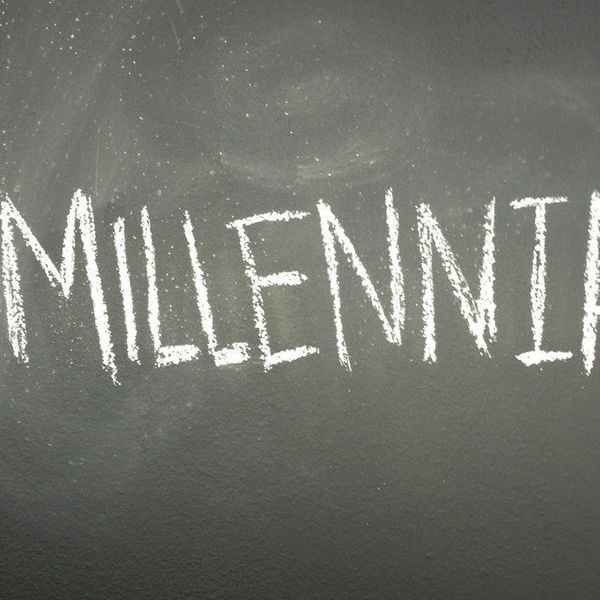Recently, I’ve been watching a lot of TedTalks. Yes, yes I'm very educated and studious in my free time. Anyways, I stumbled across one about how adults interact with teenagers. Which I've been very interested in lately. In addition to this, my dad sent me another video from a young business entrepreneur talking about millennials in the business world. A few of the concepts in these videos sort of linked up for me. I will say the video about millennials in the workplace I mostly disagree with. However, Simon Sinek, the businessman in the video, does touch on what he believes to be the key issues with the young workforce. The one I focused in one was low self esteem. Sinek claims that this generation is particularly plagued by self esteem issues generated from social media. I don't disagree. But I feel like there's something else there as well. Other factors shaping the attitudes, fears, ambitions, and personalities of our young people today.
In the Tedtalk video, a man named Roy Petitfils addresses “what teenagers want you to know.” He explains that teenagers nearly always feel invisible to the outside world with the exception of some of their peers. To adults they are grumpy, childish, and mostly full of negative space. In other words, to adults, teens are fully lacking in emotional capacity as well as emotional ability. It sounds harsh but stay with me here. Because I feel like I'm going somewhere with this.
Petitfils tells a story about a young man forced to move in his final years of high school after hurricane Katrina. He had been devastated but only showed this in failing grades and a somber attitude. Our speaker tells us that when he finally got the kid to open up it turned out he was broken up about not graduating from the same school all of his past male figures had (dad, grandfather so on). A seventeen year old sat in front of him and cried because he felt within himself that he had let down past generations by graduating from somewhere else. Those legacies brought meaning to his football games he won and the diploma he would receive. He too would be a part of the legacy. He too would pass it on. He would participate in a multi-generational tradition that he found meaning and purpose in. But all of that was taken away by the storm. Of course the teenage boy didn't say all of that in so many words. The genius I find here is that Petitfils is able to identify this problem as a lack of emotional vocabulary-- not a lack of emotional capacity. He explains that teenagers simply want one thing: “to be seen in the context of a meaningful relationships with adults.”
In my life I have seen two very different environments: homeschooling and public school. After having been enrolled at both I can tell you there are several HUGE differences. One of them is the context in which adults interact with their students. When we had class discussions as homeschoolers the teachers joined and talked with us. They challenged our opinions; not because they thought we were wrong but because our opinions were well thought out and deserved deeper investigation. We as students might not have even known it at the time but that was changing us. When I went to public school I was shocked at how this relationship shifted. My teachers just wanted to say words at me. It was never a conversation. When I disagreed it was because I was too young to really understand the problem. Because I supposedly lacked a deeper thought process than my teachers and principals. The shift was enormous. I was used to adults and they didn't intimidate me. I was used to having meaningful conversations with them but that was never asked of me again. Worse yet it wasn't even expected of me.
To bring this altogether let's go back to the Sinek video and how I said I didn't totally agree with him. What struck me then (and has been a lot lately) is the underlying conceded tone towards millennials. Because I hear it constantly. Google millennials and you'll get thousands of real articles by real journalists preaching about why millennials are the worst generation and why we ruin everything including fabric softener (for real look it up). Keep in mind I'm focusing in on the teenagers (10-19) of this generation. Get ready for me to sound hella millennial: I find this attitude extremely corrosive and damaging.
Yes, yes, I’m a millennial with a complaint just hear me out.
What I find is the main issue with this attitude is that it assumes and impresses the worst attributes onto an entire generation of young people. Because what's synonymous with that m-word? You might think entitled, lazy, greedy or weak. And yes of course some of us are those things. But so are some of every generation. All I'm saying is that I would like to propose that some of the poor self esteem of young people could possibly be derived from the stereotypes and generalizations impressed upon us.
Because I promise you teenagers and young adults have so much more to say than you expect. And, no, we don't have all of the years of life experience but that should never discount the life that we are experiencing right now. Because this stuff is hard! No, I don't worry about paying my mortgage or doing my taxes. I do worry about where I'm going to college and if I'm good enough to go to a place that will make my parents proud of me. I do worry about going to a new place with new people and trying to find my way into being accepted. Which I think is a much more generation-spanding fear than we let it be. No, I do not understand what those responsibilities are like but I can tell you that you experiencing them doesn't dull the anxiety of me experiencing my own.
What I know is that when I was homeschooled my entire class was capable of carrying on intellectual and meaningful conversations with anybody. But we never would have risen to that challenge if the adults around us never encouraged us to. So, what I want to leave you with is a simple thought: teenagers truly do want to be seen. We want you to see us for the sentient and thoughtful beings that we are. If you're an adult with teenagers of your own or you're just around them a lot please show those young people that you believe that they have the same range of emotions as you do. I promise you'll be surprised. Emotional range doesn't come with age but the vocabulary and wisdom it takes to identify and share your emotions does. Guide a young person into that space. We just want you to see us.
Simon Sinek “ The Millennial Question”--
Roy Petitfils Tedtalk--





















